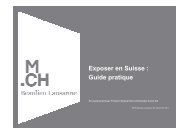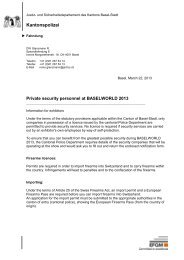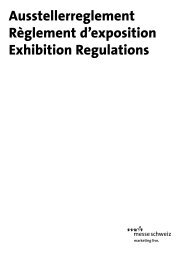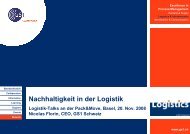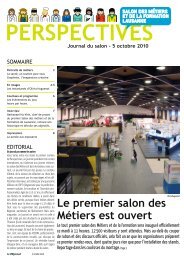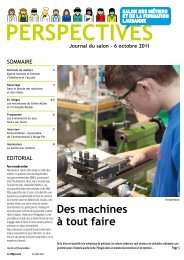MASTER MECHANICS
MASTER MECHANICS
MASTER MECHANICS
You also want an ePaper? Increase the reach of your titles
YUMPU automatically turns print PDFs into web optimized ePapers that Google loves.
72 BEHIND THE SCENES europa star<br />
Exotic straps could turn<br />
around and bite you<br />
Visit any high-end watch brand’s facilities and you will discover how the Swiss love to be environmentally<br />
friendly: Their buildings use renewable energy resources, they are constantly reducing the impact their<br />
production has on the environment, they support all kinds of ‘green’ charities, and they are even putting<br />
their press kits on bio-degradable USB keys to avoid wasting paper… but ask them about the origin of the<br />
alligator that ended up as one of their straps, and not only do they not always know, but their heads are<br />
often buried in the sand.<br />
RSophie Furley<br />
Controversial report<br />
On October 7th the Swiss German television<br />
programme Rundschau released an extremely<br />
controversial report denouncing an exotic skin<br />
outlet in Indonesia. Decontextualized images<br />
of lizards in bags with their legs tied and<br />
snakes seemingly being skinned alive were<br />
almost unbearable to watch. The Swiss watch<br />
industry was targeted. The Swatch Group<br />
released a statement, as did the Federation of<br />
the Swiss Watch Industry (FH) and the Geneva<br />
Time Exhibition (GTE). Everyone else made a<br />
call to their local strap supplier to check that<br />
they were covered, and that was that! End of<br />
scandal. Well maybe not…<br />
An orchestrated campaign<br />
So far this television report has been contained<br />
to Switzerland, but what if the international<br />
media decide to broadcast the subject? And<br />
what if consumers worldwide start to get upset<br />
and boycott products? It won’t be enough to<br />
just say that straps come from a reputable<br />
source. Brands will need to be able to prove<br />
where their straps come from and prove that<br />
the animals have been killed humanely. This is<br />
where things get complex; skins pass through<br />
many hands before they are bought by the<br />
leatherworker to be crafted into watch straps.<br />
A skin may originate in Indonesia, for example,<br />
go to Singapore for a first tanning process,<br />
then a second tanning in Italy, before being finished<br />
in France and delivered to a leatherworker<br />
in Switzerland, making traceability an<br />
urgent priority.<br />
Many animal activists are fighting for a total<br />
ban on the use of animal products, but controlled<br />
use of animals is not only beneficial to<br />
sustaining the survival of some of the world’s<br />
most threatened species, but also helps conserve<br />
ecosystems, protects other wildlife and<br />
provides an essential form of revenue for many<br />
of the world’s regions.<br />
What is CITES?<br />
One treaty which is committed to the controlled<br />
use of the world’s endangered<br />
species is the Convention on International<br />
Trade in Endangered Species of Wild Fauna<br />
and Flora (CITES) with its secretariat based<br />
in Geneva, Switzerland. CITES is a agreement<br />
that was adopted in 1973 and whose<br />
Secretariat is provided by the United Nations<br />
Environment Programme (UNEP). It works<br />
with nations worldwide to ensure that international<br />
trade in wild animals and plants<br />
does not threaten their survival. A name well<br />
known in the watch industry, every exotic<br />
watch strap that leaves Switzerland must be<br />
accompanied by an import and export permit.<br />
The veterinary office of Switzerland has<br />
put in place an express service to deliver permits<br />
in 24 hours for watch manufacturers<br />
who ship watches worldwide every day.<br />
Around 100,000 permits are delivered every<br />
year. If a strap arrives at its destination with-








